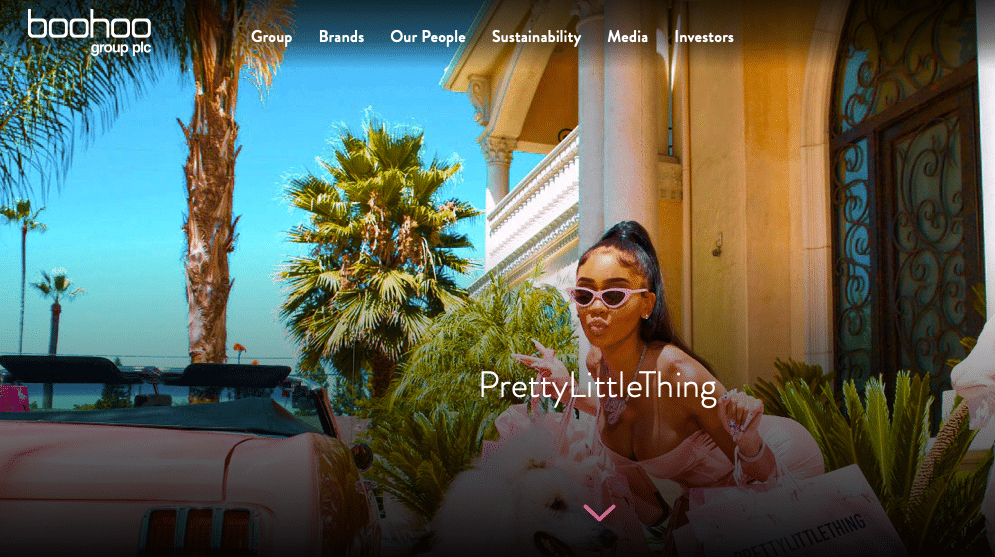Manchester-based fashion giant Boohoo Group has posted a loss of £90.7m for the year to February 28. We explore why.
Boohoo Group (which owns brands including PrettyLittleThing, BoohooMan and NastyGal) has posted a loss of £90.7m for the year to February 28. This compares to pre-tax profits of £7.8m the previous year.
As cost-of-living pressures squeeze its core customer base of twenty-somethings, along with competition from the likes of Chinese ultra-fast fashion giant Shein, sales for the year fell by 11% to £1.7bn.
WHO IS SHEIN?
Chinese-founded Shein has rapidly grown to become one of the world’s largest fashion retailers. Despite its negative reputation as a brand that churns out ‘unethical’ ultra-fast fashion at incredibly low prices, it was voted the world’s most popular fashion brand in 2022, in a report compiled by Money.co.uk. And it beat the likes of sports giants such as Nike and Adidas as the most-Googled clothing brand.
UK revenues for Boohoo Group fell 9%, compared to last year, but were up 61% on 2020. International revenues fell 13% compared to the previous year but grew 22% on 2020.
Gross margin dropped by 190 basis points to 50.6%, reflecting Covid-related cost pressures on raw materials and freight, and stock clearance.
The Group says inventory has been “reduced significantly”, down 36% year-on-year or £101m in absolute terms as at the end of February.
Adjusted EBITDA dropped 49% to £63.3 million, on margins of 3.6%.
The Group says its focus for the year ahead is on rebuilding profitability and getting back to growth. For the year ending 28 February 2024 (“FY24”), revenues are expected to be between flat and a decline of 5% versus the prior year, with increased emphasis on driving profitable sales.
In the first half, revenues are expected to decline by 10% to 15% as a result of this action being taken. In the second half of the year, the Group expects to return to revenue growth as it benefits from the investments being made across price, product and proposition under its ‘Back to Growth’ strategy.
John Lyttle, Boohoo Group CEO, says: “Looking ahead, we are investing for the future growth of this business with automation, local fulfilment capacity in the US and building global brand awareness. Our confidence in the medium-term prospects for the group remain unchanged, and as we execute on our key priorities we see a clear path to improved profitability and getting back to double digit revenue growth.”
Adjusted EBITDA for FY24 is expected to improve year-on-year as a result of operational gains, cost efficiencies and cost deflation in the retailer’s supply chain, with adjusted EBITDA margins of 4% to 4.5%, and adjusted EBITDA of between £69 million to £78 million, in line with market expectations.
We explore the challenges Boohoo Group has faced over the last year…
- Return to physical stores
Although sales were up against strong comparatives from the year before, sales fell double digits as the online retailer was hit by the switch back to instore shopping in the first restriction-free year.
Longer term trends show that online spending is now back to its pre-pandemic trajectory and Boohoo’s update comes hot on the heels of online fashion giant Asos, who also reported major losses, as consumers cut back.
- Competition
Both Boohoo Group [and Asos] have suffered from “the meteoric rise of Chinese rival Shein,” says GlobalData’s apparel analyst Louise Deglise-Favre. The ultra-fast fashion brand gained market share thanks to its aggressively low prices and constant stream of new goods.
But, paradoxically, Boohoo Group has also been affected by the growing criticism from some consumers against fast fashion, for both economical and sustainable reasons.
Boohoo’s business model of frequent discounting and low margins has made it particularly vulnerable in the current economic climate.
- Discounting cycle
The Group swung to an operating loss for the year, which has contributed to its share price now being 90% lower than its peak in June 2020. Though part of this can be blamed on higher costs, Boohoo’s business model of frequent discounting and low margins has made it particularly vulnerable in the current economic climate.
“As a result, it has reportedly asked for a 10% discount from some of its UK suppliers, which may help the bottom line but hurt its ethical reputation even further,” says Deglise-Favre.

- Consumer spending
Revenues in the UK and the rest of Europe fell 9% and 8% respectively in constant currency as the regions were the hardest hit by high inflation. As the cost-of-living crisis bites into consumer wallets and discretionary income takes a hit, the Group’s younger shoppers (who typically purchased the highest volumes of clothing), have been left with more scope to cut back…and fast fashion seems to be taking the brunt!
“The introduction of return fees on some of its brands in the UK may have deterred some consumers, as unlike Zara, which also now charges for returns, the option to return for free in-store is not possible,” adds Deglise-Favre.
- Poor USA performance
Despite inflation being softer in the US, it was the Group’s worst-performing region, with constant currency sales dropping 24%. “It’s lack of local distribution centre has left it unable to match the delivery efficiency of competitors, and although a warehouse is set to gradually open across late 2023 and early 2024, its brands might have already lost their momentum due to the dominance of rivals such as Fashion Nova and particularly Shein,” warns Déglise-Favre.
The company will also have to double down on its marketing efforts through buzzworthy collaborations to win US consumers back from the grasp of the Chinese giant.
FINAL THOUGHTS: In a challenging market, Boohoo Group has confidence in its strategy for the medium to long term but the proof will be in the pudding, and only time will tell.
Have a great idea but need the money to get it up and running? Want to start building your investment portfolio? Or have a great start-up but need coaching to take it to the next level? We can help – get in touch to find out more.
STAY UP-TO-DATE
For fresh insights, company news and business advice, subscribe to the weekly Matt Haycox newsletter at the bottom of the site.





